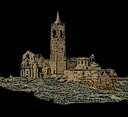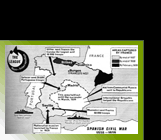| 15th December 1937 - 20th February 1938 |
THE BATTLE OF TERUEL
The Republican Army launched an offensive to capture Teruel
to pre-empt a Nationalist attack upon Catalonia. Two Republican
armies (led by Generals Hernandez Sarabia and Leopoldo Menendez)
advanced on Teruel and by nightfall on 15th December they
had surrounded the city. The garrison, which was commanded
by Colonel Rey d'Harcourt, held out in the southern part of
the city until 8th January; casualties and lack of supplies
then forced them to surrender. On 29th December General Franco
had ordered Generals Jose Varela and Antonio Aranda to mount
a counter-attack to relieve the defenders but the appalling
winter weather hampered their advance and d'Harcourt had surrendered
before they could raise the siege. The Republicans now found
that they were in danger of being besieged in Teruel themselves.
On 7th February Nationalist cavalry attacked the Republican
forces to the North of the city and forced them to retreat
and by 17th February Moroccan troops (led by General Juan
Yague) had crossed the River Alfambra. Three days later the
Nationalists had almost surrounded the city and the Republican
armies were forced to retreat along the Valencia road to the
south-east. The Nationalists then reoccupied Teruel. |
| 6th March 1938 |
The modern Nationalist cruiser Baleares, which
was escorting a convoy of merchant ships off the Mediterranean
coast near Cartagena, was sunk by torpedoes launched by Republican
destroyers. |
| 9th March - 23rd July 1938 |
THE ADVANCE ON THE MEDITERRANEAN
COAST
With the failure of the Republican attack upon Teruel the
Nationalists were now able to mount an offensive eastwards
into on Aragon and Levante. The intention was to cut Republican
Spain into two parts. The assault, which was led by General
Fidel Davila, began on 9th March and by 16th March the Nationalists
had forced the Republicans to retreat up to 60 miles in places.
Lerida, in Catalonia, surrendered to the Nationalists on 3rd
April, and twelve days later Vinaroz, a village about half-way
between Valencia and Barcelona on the Mediterranean coast,
was captured and the Republic was cut in two. The Nationalist
sought to widen this gap and on 14th June they captured Castellon
de la Plana, 40 miles North of Valencia. Republican resistance
was, however, increasing, and the Nationalists brought the
offensive to a halt to allow time for their troops to rest
and re-equip before the attack on Valencia. |
| 16th - 18th March 1938 |
Barcelona was subjected to round-the-clock bombing by Italian
aircraft based on Majorca. |
| 1st May 1938 |
Dr Negrin tried to sue for peace but General Franco demanded
nothing less than unconditional surrender. |
| 15th June 1938 |
The Republican gunboat Laya was sunk by Nationalist aircraft
at Valencia. |
| 24th July - 18th November 1938 |
THE BATTLE OF THE EBRO
To relieve pressure on the Madrid defences and to divert
Nationalist forces from their offensive towards Valencia,
the Republic ordered General Juan Modesto to launch an offensive
across the River Ebro. The attack, which was made by the newly
formed Republican Army of the Ebro, forced the Nationalists,
who were led by General Juan Yague, to retreat. In its initial
phase the offensive was very successful, and on some parts
of the front the attackers managed to advance up to 25 miles.
The attack then began to lose impetus and the Republican forces
began to dig in to await the Nationalist counter-attack. Superior
use of air power and relentless attacks on the ground gradually
forced the Republicans to retreat. This culminated, on 30th
October, in a massive Nationalist attack and by 18th November
the Republicans had been forced back across the River Ebro. |
| 21st September 1938 |
Dr Negrin announced, in a speech to the League of Nations,
that the International Brigades were to be withdrawn from the
fighting. |
| 22nd September 1938 |
The International Brigades were withdrawn from the front-line
prior to them being "repatriated". |
| 9th October 1938 |
The Republican submarine C1 was sunk by Nationalist aircraft
at Barcelona. |
| 11th October - 1st November 1938 |
The leaders of the POUM were put on trial in Barcelona. Two
were acquitted but four were imprisoned. |
| 15th November 1938 |
The International Brigades paraded through Barcelona before
they were disbanded. |
| 23rd December 1938 - 26th January 1939 |
THE CATALONIAN CAMPAIGN
Having cut the Republic into two the Nationalists now launched
an offensive against Catalonia. The attack on the forces defending
the Republican front-line was made by six Nationalist armies
on a front that stretched from the Pyrenees to South of the
River Ebro. It proved too much for the already exhausted Republicans.
They retreated towards Barcelona and, once Borjas Blancas
was captured on 4th January, the retreat became a rout. Tarragona
surrendered on 14th January and by 24th January the Nationalists
were within 3 miles of Barcelona. At this point the Government,
led by Juan Negrin, fled to Gerona. The Republican troops
in Barcelona continued to maintain a token resistance until
26th January, when the city finally surrendered.
30th December 1938
The Republican destroyer Diez was damaged by the Nationalist
cruiser Canarias off the coast near Catalon Bay. The Diez
was so badly damaged that she had to be beached to stop her
sinking. She was later towed to Gibraltar and remained there,
interned, until the end of the war.
5th February 1939
The Nationalists captured Gerona. |




